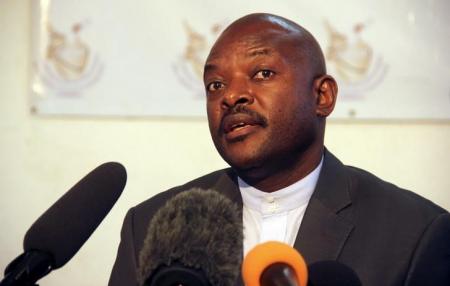The Presidency said Friday that President Muhammadu Buhari did not indict the United States Government, accusing it of using the Leahy Law to aid and abet Nigerian terror sect, Boko Haram, as reported in some media across the world.
The Special Adviser to the President on Media and Publicity, Femi Adesina, said in a statement that some of the media reports based on President Buhari’s remarks at an event during his US trip as “unfortunate misinterpretation and distortion”.
The statement reads: “Persisting claims in the local and international media that President Muhammadu Buhari has accused or indicted the United States Government of helping the terrorist group, Boko Haram are untrue and widely off mark. Reports to that effect are an unfortunate misinterpretation and distortion of the President’s remarks at the United States Institute of Peace (USIP) during his highly successful official visit to Washington DC.
“Indeed, President Buhari made it abundantly clear in those remarks, copies of which were circulated to the media, that he was convinced that the United States could never support groups such as Boko Haram. I know the American people cannot support any group engaged in these crimes, the President clearly stated.
“The regrets expressed by President Buhari at USIP about the impact of the application of the Leahy Law on Nigeria’s war against Boko Haram and terrorism cannot be construed as an indictment of President Barack Obama and the United States Government who have publicly and privately declared their preparedness to give the Buhari Administration the fullest possible support and assistance.
“Within the context in which they were made, President Buhari’s comments on the adverse effect of the Leahy Law on Nigeria’s efforts to contain Boko Haram’s atrocious acts of terrorism should only be taken as a passionate appeal for even greater understanding and support from a very powerful and longstanding ally. “President Buhari has nothing but the highest possible regard for President Obama, the United States Government, the people of the United States, their laws and institutions.
“The President had very successful and useful talks with President Obama, Vice President Joe Biden, Secretary of State John Kerry, other high-ranking US government officials and members of United States Congress during his visit to Washington DC. It is his expectation that those talks will lead to better mutual understanding and a further deepening of bilateral relations between Nigeria and the United States, especially in Nigeria’s current priority areas of defence anddescribing such insinuation as “untrue and widely off mark”.
President Buhari had in his remarks at the United States Institute for Peace (USIP), in Washington DC, had said that the blanket application of the United States Leahy Law on the grounds of unproven allegations of human rights violations leveled against Nigerian armed forces was aiding and abetting the activities of Boko Haram.
Buhari had said the Nigerian armed forces have remained largely impotent in the fight against terrorism because they do not possess the appropriate weapons and technology to match Boko Haram.
The US Leahy Law, is a U.S. human rights law that prohibits the U.S. Department of State and Department of Defense from providing military assistance to foreign military units that violate human rights with impunity. It is named after its principal sponsor, Senator Patrick Leahy of Vermont. To implement this law, U.S. embassies and the Bureau of Democracy, Human Rights, and Labor and the appropriate regional bureau of the U.S. Department of State vet potential recipients of security assistance.
If a unit is found to have been credibly implicated in a serious abuse of human rights, assistance is denied until the host nation government takes effective steps to bring the responsible persons within the unit to justice. While the U.S. Government does not publicly report on foreign armed force units it has cut off from receiving assistance.
Media reports have indicated that security force units in Bangladesh, Bolivia, Colombia, Guatemala, Mexico, Nigeria, Turkey, Indonesia, and Pakistan have been denied assistance due to the Leahy Law.
According to Buhari, “In our efforts at combating the activities of Boko Haram, the new Government has sought and obtained the support of not only our neighbours other international friends and partners. Regrettably, the blanket application of the Leahy Law by the United States on the grounds of unproven allegations of human rights violations levelled against our forces has denied us access to appropriate strategic weapons to prosecute the war against the insurgents.
“In the face of abduction of innocent school girls from their hostels, indiscriminate bombings of civilians in markets and places of worship, our forces have remained largely impotent because they do not possess the appropriate weapons and technology which they could have had, had the so called human rights violations not been an obstacle.
“Unwittingly, and I dare say, unintentionally, the application of the Leahy law amendment by the U. S. Government has aided and abated the Boko Haram terrorist group in the prosecution of its extremist ideology and hate, the indiscriminate killings and maiming of civilians, in raping of women and girls, and in their other heinous crimes. I believe this is not the spirit of the Leahy Laws. I know the American people cannot support any group engaged in these crimes.
“ I therefore strongly appeal to both the Executive Arm and the US Congress to examine how the US Government can provide us with far more substantial counter-terrorism assistance with minimal strings. The longer we delay, the deadlier the Boko Haram gets. At all events, we have re-written the rules of engagement protecting the rights of combatants and in particular safeguarding civilians in theatres of conflict”.














